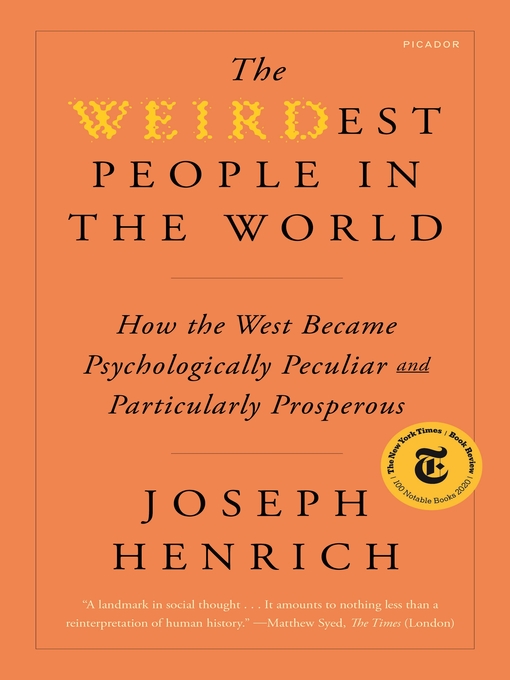
The WEIRDest People in the World
How the West Became Psychologically Peculiar and Particularly Prosperous
کتاب های مرتبط
- اطلاعات
- نقد و بررسی
- دیدگاه کاربران
نقد و بررسی

June 15, 2020
The chair of the department of human evolutionary biology at Harvard limns the social and mental conditions that have made the West wealthy. Other writers, notably Carlo Cipolla, have linked the rise of literacy to prosperity in the developed world. Henrich takes the argument further to correlate it to being "WEIRD"--i.e., "Western, Educated, Industrialized, Rich, and Democratic." Literacy is a major component, especially the Protestant literacy that placed the vernacular Bible into the hands of individuals, emphasized free will, and encouraged the cultivation of individual traits and interests. So it is that Westerners--and members of societies that have emulated the West, such as Japan--also have peculiar, novel, and relatively recent mental markers, including a bias toward the right hemisphere of the brain and for analytical processing of data in the place of "broad configurations and gestalt patterns." There are emotional and sociological sequelae, including the development of cultures that favor guilt over shame and of notions of justice and social organization that accord high levels of trust to strangers as opposed to kin-based groups. This last represents a significant break with primate tradition, with its preference for "kin altruism." There are all kinds of wrinkles to this engrossing story, which Henrich illustrates with graphs and charts. Where there are high rates of cousin marriage, he writes, the more likely it is that people mistrust strangers; concomitantly, there are few "impersonal trust levels" that allow for the flourishing of credit and trade. Throughout, the author dives deep, even correlating the willingness to donate blood to the extension of kin altruism to those who aren't related to us. "Many WEIRD people," he writes, "have a set of folk beliefs that lead them to assume that any observed psychological differences among populations are due to economic differences." In fact, the opposite is true: First come the psychological differences, then comes the money, which, the author allows, isn't perfectly understood. A fascinating, vigorously argued work that probes deeply into the way "WEIRD people" think.
COPYRIGHT(2020) Kirkus Reviews, ALL RIGHTS RESERVED.

July 20, 2020
Henrich (The Secret of Our Success), a psychology and economics professor, proposes a grand thesis about how the cultures he identifies as WEIRD—“Western, Educated, Industrialized, Rich and Democratic”—came to be so, in this ambitious and fascinating book. The acronym is intentional, to signal that the cultural experience and individualistic mindset of countries such as the U.S. and U.K. are historically unusual. The first major shift Henrich identifies occurred in medieval Europe, as traditional kin-based loyalties were weakened by the intellectual and cultural dominance of the Roman Catholic Church. In his view, the later emergence of representative democracy wasn’t due to “an intellectual epiphany” but to the experience of those people in the late Middle Ages who “began to form competing voluntary associations” and thus became more open to viewing themselves as individuals. Henrich also explores the persistent distinction in mindset between individualistic and communal societies, based on psychological studies conducted by himself and colleagues. For example, people in individualistic societies more often reported experiencing guilt, concerning how one views oneself, while those in communal societies more often felt shame, concerning how one is viewed by other people. This meaty book is ready-made for involved discussions.

























دیدگاه کاربران